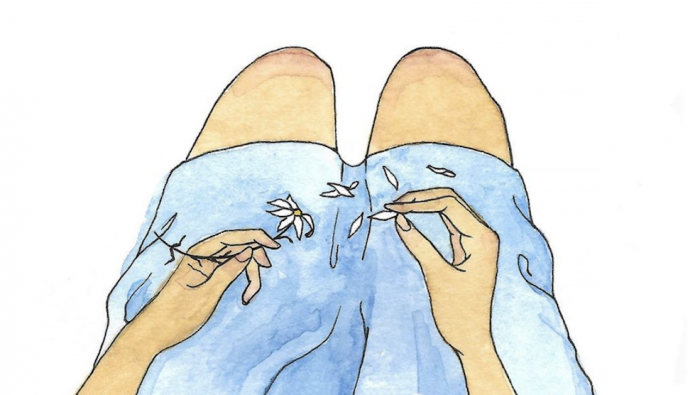The collective is going through some deep transitions right now.
Whenever there is a lot of change happening at once, it can be difficult to find our footing. We long to cling to something that makes sense or allows us to feel safe in a sea of chaos, messiness, and upheaval.
Below are 11 suggestions to help us reconnect with ourselves and find harmony again.
When the outside world feels like a circus, we can reclaim our inner world in the following ways:
1. Follow a curiosity.
There is a wonderful talk by Elizabeth Gilbert about following curiosities versus passions. She explains that a passion can sometimes be too intense, too overwhelming. Passions tend to take over our lives, while curiosities are more manageable. Curiosities can definitely lead us to a passion, but it’s important to give ourselves some time and space to walk through the curiosity garden.
Curiosity allows us to play, to investigate, to ponder. It is fun, light, and non-intimidating. It can make us childlike and full of wonder—something that can serve our creativity and problem-solving skills.
It doesn’t matter whether your curiosity is big or small—it matters that you follow it and see what it ignites in you.
2. Drink more water.
Did you know that 75 percent of Americans are chronically dehydrated? Even if we are drinking 8 to 10 cups of water a day, our caffeine and salt intake offsets this.
Up to 60 percent of the adult body is water. It is needed for every function as well as to flush out toxins. Drinking more water is a simple solution for many things: headaches, fatigue, feeling lightheaded, poor digestion, better concentration, maintaining proper body temperature, clearing brain fog, and transportation and absorption of nutrients. Water is life on all levels.
Treat yourself to a reusable water bottle and fill it up in the morning. Keep track of your intake so you can measure how much better you feel. Bottoms up!
3. Help an animal.
Thank God for animals. They offset our human interactions and remind us what love is.
One of the reasons humans connect with animals is because they teach us about truly being in the moment. They are all instinct, and there is no judgment. We all need some space free from judgment.
There are many ways to be in service to our furry, feathered, and finned friends. Visit a shelter and volunteer. Donate to a charity that rescues and heals animals in trouble. Let your neighbor know you can pet sit. Buy some pet food and supplies and donate it to a sanctuary.
We must become a better voice for the voiceless.
4. List 10 things each night that you are grateful for.
I can’t stress enough the importance of gratitude and the way it rewires our brains. We are chronically conditioned to look for the negative, the lack, the unfairness.
When we hop on the gratitude train, we are awakened. We are so blessed, and we rarely acknowledge it. If we have clean water and a bed to sleep in, we are blessed. If we ate today, we are blessed. If we have a friend or parent who cares about us, we are blessed.
Blessings are not just the big things; they are all the little things that we take for granted. The things we don’t say thank you for because we believe they are a given and will always be there.
Naming what we are grateful for creates new neural pathways in the brain, making it easier over time to switch our focus from lack to abundance. We teach our brain to look for and appreciate the good. If we practice gratitude enough, we will even find blessings in the things we judge as bad—a fender bender, a breakup, or a lost opportunity.
Buy yourself a beautiful journal and start noticing.
5. Stretch.
When I am feeling yucky, 10 minutes of stretching changes everything. Stretching is such a great go-to activity because we can do it anywhere and at our own pace.
When we stretch, we are helping the body to be more effective in all ways. Stretching helps our circulation, digestion, nervous system, and immunity. It relieves stress, helps our parasympathetic nervous system to turn on, and frankly, it feels so good.
The other thing stretching does is give us some time to reconnect to our bodies. With so much mental activity during the day, our bodies usually miss out on some TLC.
Do some stretches at work between meetings or make it your morning or evening ritual—or both!
6. Create a sacred space.
All of us need a place we can escape to—someplace that feels safe, inviting, and sacred.
Carve out this little corner of the world for yourself. It can be a room, a couch, a favorite chair, or even your car. Put up pictures that inspire you and help you return to your own rhythms. Burn some incense or candles (or both!). Have some of your favorite items and display them. Play some music and say a prayer.
When we give ourselves the gift of space from others, we fill up our own tank again and allow new creative energy to flow. We can give to those we care about more freely because we have taken time to process and release.
When we decide to spend some time in this sacred space, we give ourselves the gift of our own presence. We can reflect, analyze, and meditate. We can rediscover parts of ourselves that may have fallen by the wayside. We get to just be for a moment.
7. Tell someone what they mean to you.
When was the last time you verbally let someone know that you love them, appreciate them, or care for them? So often, we assume people know how we feel.
Do a little experiment and express yourself to someone. I guarantee it will make their day—and yours.
8. Buy yourself some flowers or a plant.
I recently started collecting succulents and house plants. They bring a life and charm to my home and keep me connected to nature.
Having houseplants and flowers is good for us. They clean the air, which in turn helps our breathing. They decrease the incidents of dry skin, colds, sore throats, and dry coughs through a process called transpiration (when water evaporates through the leaves). Plants boost healing, decrease recovery time for hospital patients, and they help us work better. Having plants in our office can boost memory retention by up to 20 percent, as well as increasing concentration and productivity.
Happy plant shopping!
9. Change a habit that is no longer serving you.
Many of our habits are either unconscious (because we have been doing them for so long without question), or they came about as a means of protection or survival.
A habit can be anything—the way we think, what we choose to eat, how we speak to our partner, what we focus on, how we deal with problems, and so on.
First, become aware: what are the unconscious habits we continue to participate in that either hold us back or prevent us from moving forward? Sometimes, a habit is so deeply ingrained that we don’t even think to examine it. It has become like second nature to us.
If you’re having trouble, ask someone you trust if they have any feedback on what they notice. Many times we are so inside our own world that we can’t see the bigger picture.
Once you discover something you want to change, ditch or improve, do it for 21 days. Studies have shown that it takes 21 days (or more, depending on your situation) of conscious, consistent effort to make or break a habit.
Notice what comes up for you during this process. Depending on what habit you are trying to break or create, this is a wonderful experiment in listening to ourselves.
10. Take an action toward better health.
Health really is wealth—really. We can’t do or enjoy anything without our bodies feeling good. And for those of us who have been physically debilitated for a time, this really hits home.
When we are ill or don’t feel good, nothing else matters. Not our bank account balance, not our accomplishments, not even our close connections. We just want to feel better. We realize that our body is the basis of everything we want to do, be, and have.
If there is something that you are being called to do for your body, start now. Please don’t put it off. If it is expensive, ask for guidance and assistance or a loan. If it is causing you pain, ask someone to drive you to your appointment. Our bodies talk to us, and we need to start listening—especially if we are getting older.
11. Find a go-to mantra.
Throughout the day, we intake loads of information. Our brain is constantly processing what we see, hear, touch, feel, and taste, and just like a computer, it can experience burnout and overwhelm.
Find a simple, go-to mantra that can help you calm down and get you back to the present moment.
A mantra is a word, sound, or slogan repeated frequently to aid with concentration and meditation. The word “mantra” derives from a Sanskrit word meaning a “sacred message or text, charm, spell, or counsel.”
When we have a go-to mantra, it serves as our life raft. We can turn to it any time we are stressed, overwhelmed, or need to make a decision. My personal favorites are, “I surrender,” “I trust myself,” and “Thank you.” Keep it simple so it can be open-ended and fit any situation or circumstance.
Notice how having a mantra to concentrate on helps you calm down and breathe more deeply. It helps our mind focus on one thing versus the thousands of things that may be fighting for our attention.
Repeating a mantra will help to ground, relax, and support you. It will get your cortisol levels back to normal and improve creative problem-solving skills.
~
I hope these suggestions serve you and help create more peace in your life. When we take some time to reconnect with ourselves, we build more trust, compassion, and self-love. We find more joy and depth in everything we do.







Read 8 comments and reply